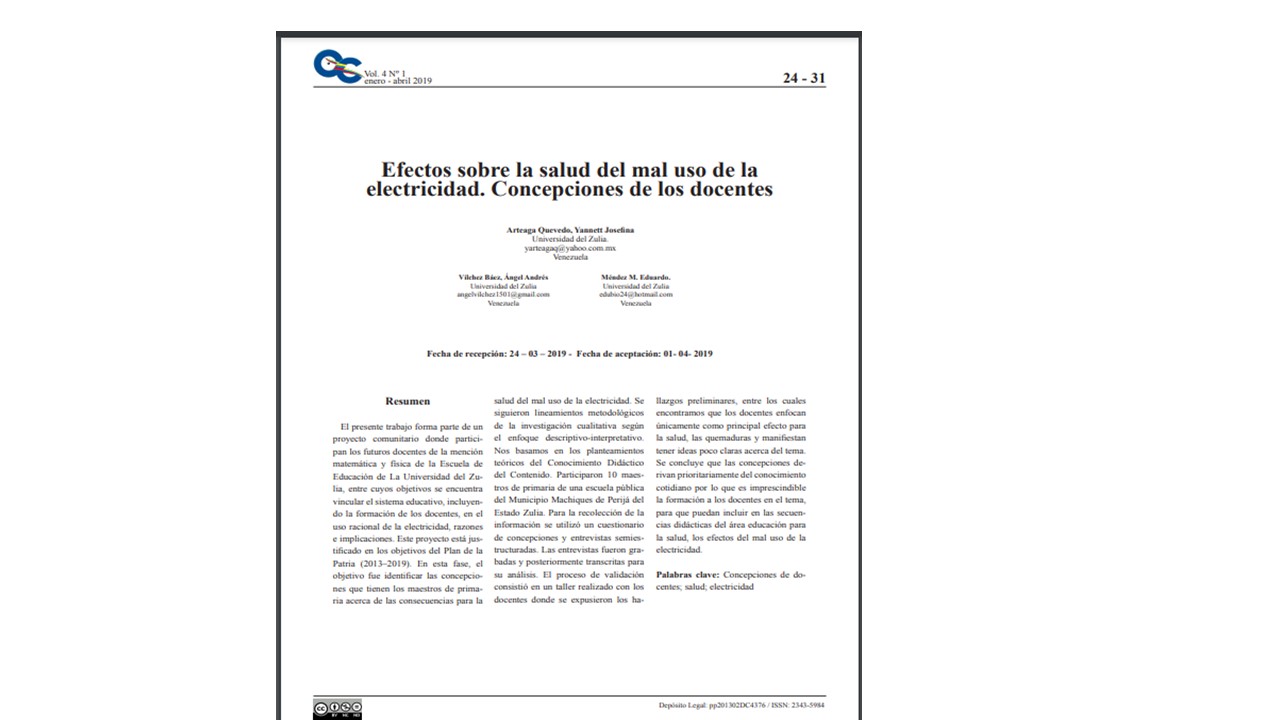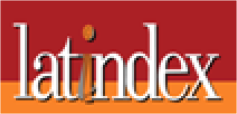Effects on health of misuse of electricity. conceptions of the teachers
Keywords:
Health;, electricity, teachersAbstract
The present work is part of a community project in which future teachers of mathematics and physics of the School of Education of the University of Zulia participate. One of the objectives of this project is to link the educational system, including teacher training, in the rational use of electricity, reasons and implications. This project is justified by the objectives of the Plan de la Patria (2013-2019). In this phase, the objective was to identify the conceptions that primary school teachers have about the health consequences of the misuse of electricity. Methodological guidelines for qualitative research were followed according to the descriptive-interpretative approach. We were based on the theoretical approaches of Didactic Content Knowledge. Ten primary school teachers from a public school in the Machiques de Perijá Municipality of Zulia State participated. For the collection of information, a questionnaire of conceptions and semi-structured interviews was used. The interviews were recorded and later transcribed for analysis. The validation process consisted of a workshop with the teachers where the preliminary findings were presented, among which we found that the teachers focus only on burns as the main effect on health, and state that they have unclear ideas about the subject. It was concluded that the concepts derive primarily from everyday knowledge, so it is essential to train teachers on the subject, so that they can include in the didactic sequences of the area health education, the effects of the misuse of electricity.
Downloads
References
Arteaga,Y.(2008).Conocimientos y creencias de docentes de ciencias naturales. Universidad del Zulia. Facultad de Humanidades y Educación. División de Estudios para Graduados. Doctorado en Ciencias Humanas. Tesis Doctoral.
Bolívar, A.(2005).Conocimiento Didáctico del Contenido y Didácticas específicas. Profesorado. Revista de curriculum y formación del profesorado. Vol. 9 Nº 2. Disponible en: www.ugr.es/local/recfpro/Rev92ART6.pdf
Campanario, J. M. y Otero, J. (2000). Más allá de las ideas previas como dificultades de aprendizaje: las pautas de pensamiento, las concepciones epistemológicas y las estrategias cognitivas de los alumnos de ciencias. Revista Enseñanza de las Ciencias 18(2). pp 155- 169.
Carrascosa J, Gil-Pérez D. y Vílchez A. (2008). Concepciones espontáneas sobre la situación del mundo: un aspecto ignorado en las investigaciones sobre concepciones alternativas. En Moreno J. (ed.). Didácticas de las Ciencias. Nuevas perspectivas. Segunda parte. pp 237-248. La Habana: Educación Cubana.
Flick U. (2004). Introducción a la investigación cualitativa. Ediciones Morata, S.L. Madrid, España.
García, E. ; Rodríguez, F. ; Solis, C. ; Ballenilla, F. (2007). Investigando el problema del uso de la energía. Rev. Investigación en la Escuela. Nº 63. pp 29-45.
Marcelo, C.(1993).Cómo conocen los profesores la materia que enseñan. Algunas contribuciones de la investigación sobre el conocimiento didáctico del contenido, en Ministerio del Poder Popular para la Educación (2010). Líneas Orientadoras para la educación energética en el subsistema de Educación Básica en el marco del desarrollo curricular.Disponible en: www.corpoelec.gob.ve/uso-racional-y-eficiente-de-la-energia-electrica
República Bolivariana de Venezuela. Plan de la Patria. 2013 – 2019.
Rivera-Juárez, J.M. ; Madrigal-Melchor J.; Enciso-Muñoz A. y López- Chávez J. (2011). Persistencia de las ideas previas sobre electricidad de los alumnos de la licenciatura de física de la Universidad Autónoma de Zacatecas. Rev.LatAm.J.Phys. Educ. Vol. 5, Nº 2 pp 537-542. Disponible en: http://www.lajpe.org
Sandín, Mª. P. (2003). Investigación cualitativa en educación. Fundamentos y tradiciones. McGraw Hill/ Interamericana de España. Madrid. España.
Shulman L. S. (1986). Those who understand: knowledge growth in teaching. Educational Researcher. 15 (2). pp. 4-14.
Vásquez, A.(1998). Ideas del profesorado sobre la energía: usos, aplicaciones y tecnologías. Rev. Interuniversitaria de formación del profesorado Nº 32 pp. 145-158.

Downloads
Published
How to Cite
Issue
Section
License

This work is licensed under a Creative Commons Attribution-NoDerivatives 4.0 International License.







